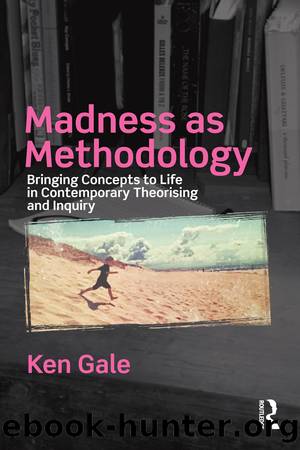Madness As Methodology by Ken Gale

Author:Ken Gale
Language: eng
Format: epub
Publisher: Taylor & Francis (CAM)
The subtle and nuanced energies of the kinds of discussions and exchanges that can take place within collaborative writing practices always have the potential to produce ethically charged concepts as events which themselves work to produce the molecular energies of inquiry. The constant shifting of intensities, the fluid interplay between concept, affect and percept that this involves is redolent of what Davies and Gannon refer to as mo(ve)ment, a term that I have used frequently in this book to animate thought in active and creative ways. They use the elision of this complex term to describe the spatial and temporal transformations that occur within the âethical reflexive research practices of collective biographyâ (2006: x). So the ethically informed processes and practices of collaborative writing as a method of inquiry work in conjunction with âassemblage/ethnographyâ to destabilise the molar by paying attention to and incorporating the molecular and intensive practices of new and emergent empiricisms.
As suggested above, these reconfigurations of empiricism that inform the kinds of collaborative writing as method of inquiry that have been discussed in this plateau can be characterised by the metonymic principles of association to be found in the philosophy of Hume and through the articulations of Deleuze in his early monograph Empiricism and Subjectivity. In this respect, Deleuze talks of an associational empiricism that involves âhabits of thought, everyday notions of good sense, current ideas, and complexes of ideas which correspond to the most general and most constant needs common to all minds and all languagesâ (1991: 103). Difference precedes fleeting thoughts, loose conversations and hitherto unnoticed gestures; their connections can be observed and be brought together in what Bennett describes as âagentic assemblagesâ (2010: 20). These observations of what Stewart (2007) describes as âordinary affectsâ might make connections, they might offer what Deleuze (1988) describes as âhaecceitiesâ and contribute to the shifting fluidity of âbodies-without-organsâ (ibid.). As Stewart points out in the introduction to her book,
Ordinary Affects is an experiment, not a judgment. Committed not to the demystification and uncovered truths that support a well-known picture of the world, but rather to speculation, curiosity, and the concrete, it tries to provoke attention to the forces that come into view as habit or shock, resonance or impact. Something throws itself together in a moment as an event and a sensation; a something both animated and inhabitable.
Ibid.: 1
Download
This site does not store any files on its server. We only index and link to content provided by other sites. Please contact the content providers to delete copyright contents if any and email us, we'll remove relevant links or contents immediately.
| Anthropology | Archaeology |
| Philosophy | Politics & Government |
| Social Sciences | Sociology |
| Women's Studies |
Cecilia; Or, Memoirs of an Heiress — Volume 1 by Fanny Burney(31324)
Cecilia; Or, Memoirs of an Heiress — Volume 3 by Fanny Burney(30928)
Cecilia; Or, Memoirs of an Heiress — Volume 2 by Fanny Burney(30885)
The Great Music City by Andrea Baker(21195)
We're Going to Need More Wine by Gabrielle Union(18066)
Bombshells: Glamour Girls of a Lifetime by Sullivan Steve(13101)
Pimp by Iceberg Slim(12923)
All the Missing Girls by Megan Miranda(12740)
Fifty Shades Freed by E L James(12443)
Norse Mythology by Gaiman Neil(11875)
Talking to Strangers by Malcolm Gladwell(11862)
Crazy Rich Asians by Kevin Kwan(8342)
Mindhunter: Inside the FBI's Elite Serial Crime Unit by John E. Douglas & Mark Olshaker(7829)
The Lost Art of Listening by Michael P. Nichols(6463)
Enlightenment Now: The Case for Reason, Science, Humanism, and Progress by Steven Pinker(6403)
Bad Blood by John Carreyrou(5761)
The Four Agreements by Don Miguel Ruiz(5502)
Weapons of Math Destruction by Cathy O'Neil(5030)
We Need to Talk by Celeste Headlee(4862)
